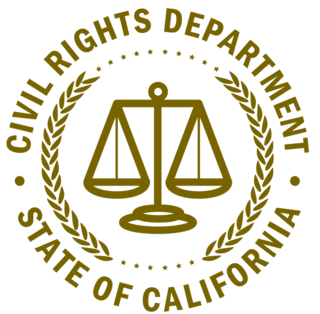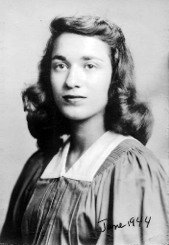In United States labor law, a hostile work environment exists when one's behavior within a workplace creates an environment that is difficult or uncomfortable for another person to work in, due to illegal discrimination. However, a working environment that is unpleasant and frightening for the victim due to sexual advances that have been denied by the victim, is what constitutes hostile work environment sexual harassment. Common complaints in sexual harassment lawsuits include sexual gossip unrelated to work, jokes about physical contact inappropriate in workplace, commentary on physical appearance/attractiveness, joking about sex acts, fondling, suggestive remarks, sexually-suggestive photos displayed in the workplace, use of sexual language, or off-color jokes. Small matters, annoyances, and isolated incidents are usually not considered to be statutory violations of the discrimination laws. For a violation to impose liability, the conduct must create a work environment that would be intimidating, hostile, or offensive to a reasonable person. An employer can be held liable for failing to prevent these workplace conditions, unless it can prove that it attempted to prevent the harassment and that the employee failed to take advantage of existing harassment counter-measures or tools provided by the employer.

Sexual harassment is a type of harassment involving the use of explicit or implicit sexual overtones, including the unwelcome and inappropriate promises of rewards in exchange for sexual favors. Sexual harassment can be physical and/or a demand or request for sexual favors, making sexually colored remarks, showing pornography, and any other unwelcome physical, verbal, or non-verbal conduct of a sexual nature. Sexual harassment includes a range of actions from verbal transgressions to sexual abuse or assault. Harassment can occur in many different social settings such as the workplace, the home, school, or religious institutions. Harassers or victims can be of any gender.

The United States Women's Bureau (WB) is an agency of the United States government within the United States Department of Labor. The Women's Bureau works to create parity for women in the labor force by conducting research and policy analysis, to inform and promote policy change, and to increase public awareness and education.

The California Civil Rights Department (CRD) is an agency of California state government charged with the protection of residents from employment, housing and public accommodation discrimination, and hate violence. It is the largest state civil rights agency in the United States. It also provides representation to the victims of hate crimes. CRD has a director who is appointed by the governor of California and maintains a total of five offices and five educational clinics throughout the state. Today, it is considered part of the California Business, Consumer Services, and Housing Agency.

The President's Commission on the Status of Women (PCSW) was established to advise the President of the United States on issues concerning the status of women. It was created by John F. Kennedy's Executive Order 10980 signed December 14, 1961. In 1975 it became the National Association of Commissions for Women.
Employment discrimination law in the United States derives from the common law, and is codified in numerous state, federal, and local laws. These laws prohibit discrimination based on certain characteristics or "protected categories". The United States Constitution also prohibits discrimination by federal and state governments against their public employees. Discrimination in the private sector is not directly constrained by the Constitution, but has become subject to a growing body of federal and state law, including the Title VII of the Civil Rights Act of 1964. Federal law prohibits discrimination in a number of areas, including recruiting, hiring, job evaluations, promotion policies, training, compensation and disciplinary action. State laws often extend protection to additional categories or employers.

Human rights in Austria are generally respected by the government; however, there were problems in some areas. There were some reports of police abuse and use of unjustified force against prisoners. Antisemitic incidents, including physical attacks, name-calling, property damage, and threatening letters, telephone calls, and Internet postings occurred during the year. There was some governmental and societal discrimination against fathers, Muslims and members of unrecognized religious groups, particularly those considered "sects". There were incidents of neo-Nazi activity, rightwing extremism, and xenophobia. Trafficking in women and children for prostitution and labor also remained a problem.
Equal Rights Advocates (ERA) is an American non-profit gender justice/women's rights organization that was founded in 1974. ERA is a legal and advocacy organization for advancing rights and opportunities for women, girls, and people of marginalized gender identities through legal cases and policy advocacy.
Equality and diversity is a term used in the United Kingdom to define and champion equality, diversity and human rights as defining values of society. It promotes equality of opportunity for all, giving every individual the chance to achieve their potential, free from prejudice and discrimination.
Workplace harassment is the belittling or threatening behavior directed at an individual worker or a group of workers.
The Nova Scotia Human Rights Commission was established in Nova Scotia, Canada in 1967 to administer the Nova Scotia Human Rights Act. The Nova Scotia Human Rights Commission is the first commission in Canada to engage a restorative dispute resolution process.

Bernice Resnick Sandler was an American women's rights activist. She is best known for being instrumental in the creation of Title IX, a portion of the Education Amendments of 1972, in conjunction with representatives Edith Green and Patsy Mink and Senator Birch Bayh in the 1970s. She has been called "the Godmother of Title IX" by The New York Times. Sandler wrote extensively about sexual and peer harassment towards women on campus, coining the phrase "the chilly campus climate".

LGBT employment discrimination in the United States is illegal under Title VII of the Civil Rights Act of 1964; employment discrimination on the basis of sexual orientation or gender identity is encompassed by the law's prohibition of employment discrimination on the basis of sex. Prior to the landmark cases Bostock v. Clayton County and R.G. & G.R. Harris Funeral Homes Inc. v. Equal Employment Opportunity Commission (2020), employment protections for LGBT people were patchwork; several states and localities explicitly prohibit harassment and bias in employment decisions on the basis of sexual orientation and/or gender identity, although some only cover public employees. Prior to the Bostock decision, the Equal Employment Opportunity Commission (EEOC) interpreted Title VII to cover LGBT employees; the EEOC determined that transgender employees were protected under Title VII in 2012, and extended the protection to encompass sexual orientation in 2015.

The Sexual Harassment of Women at Workplace Act, 2013 is a legislative act in India that seeks to protect women from sexual harassment at their place of work. It was passed by the Lok Sabha on 3 September 2012. It was passed by the Rajya Sabha on 26 February 2013. The Bill got the assent of the President on 23 April 2013. The Act came into force from 9 December 2013. This statute superseded the Vishaka Guidelines for Prevention Of Sexual Harassment (POSH) introduced by the Supreme Court (SC) of India. It was reported by the International Labour Organization that very few Indian employers were compliant to this statute. Most Indian employers have not implemented the law despite the legal requirement that any workplace with more than 10 employees need to implement it. According to a FICCI-EY November 2015 report, 36% of Indian companies and 25% among MNCs are not compliant with the Sexual Harassment Act, 2013. The government has threatened to take stern action against employers who fail to comply with this law.
Sexual harassment in the workplace in US labor law has been considered a form of discrimination on the basis of sex in the United States since the mid-1970s. There are two forms of sexual harassment recognized by United States law: quid pro quo sexual harassment and behavior that creates a hostile work environment. It has been noted that a number of the early sexual harassment cases were brought by African American women and girls.

Victoria Ann Lipnic is an American lawyer and public figure. She served in multiple senior United States government positions. She was Commissioner of the U.S. Equal Employment Opportunity Commission (EEOC), nominated to two terms by President Barack Obama, 2010 – 2020.) She served as Chair (Acting) of the EEOC under President Donald J. Trump from 2017 – 2019. Prior to her appointments to the EEOC, she was Assistant Secretary of Labor under President George W. Bush. The United States Senate confirmed her unanimously to each of these positions.
Vermont has the 10th smallest gender wage gap of all the states in America, with women who work full-time year round in Vermont making, on average, 84 cents for every dollar made by a man. This equates to $7,589 yearly. Together, Vermont women lose over $705 million every year. For a single person, 16 cents on every dollar amounts to approximately seven months of rent, and $7,000 for a family of four would pay for six months of child care or groceries.
Working Women United (WWU) is a women's rights organisation based in the United States which was formed in Ithaca, New York in 1975, to combat sexual harassment of women in the workplace.
The Royal Canadian Mounted Police (RCMP) is Canada's national police force established in 1920 after the Cabinet moved to have the Royal North-West Mounted Police absorb the Dominion Police. The RCMP's primary mandate is to maintain "peace and order," and Officers provide police services to all Canadian provinces, excluding Québec and Ontario, as well as to the three Canadian territories, and more than 180 municipalities and Indigenous communities.
Nicola Caroline Vincent is an English-born Australian government officer. She is the inaugural Public Sector Gender Equality Commissioner for Victoria, Australia. Prior to this, Vincent was the Commissioner for Equal Opportunity in South Australia (SA) from May 2016 to September 2020.








